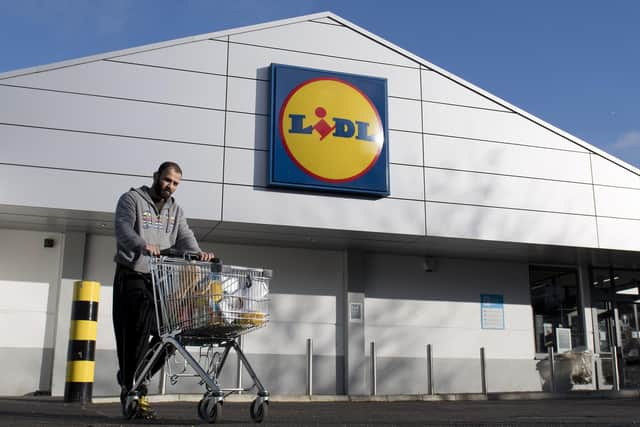Cost of living crisis: How Lidl is putting SNP to shame amid rising levels of hunger – Susan Dalgety
and live on Freeview channel 276
“Help tackle hunger in your community,” it stated. I am used to seeing giant posters about food insecurity and hunger, but in Malawi, one of the poorest countries in the world. Not in Fisherrow, on the edge of one of the richest cities in the UK and five miles from the Scottish Parliament.
But the stark reality of life in Edinburgh, and across Scotland, is that there will be people who go to bed tonight hungry and who will wake up tomorrow morning hungry, with little or no prospect of eating a nutritious, tasty meal.
Advertisement
Hide AdAdvertisement
Hide AdAnd the numbers of people going hungry will only increase as inflation hits nine per cent and rising, and food bills are expected to cost households an extra £400 a year.
Lidl’s ‘Good to Give’ initiative is a first for the grocery industry, though all the main supermarkets have supported food banks in recent years. What’s new about Lidl’s campaign is that shoppers can choose from a branded range of 30 long-life items, which will then be donated to local food banks.
The supermarket said it had launched the campaign because it wanted to ensure that “good food is accessible to everyone”.
The shopping list of Good to Give items has been agreed with Neighbourly, an online platform which connects businesses with surplus food to local food banks, such as the Community Pantry in Mayfield, Midlothian, and the Community One Stop shop in Edinburgh’s Broomhouse.


Advertisement
Hide AdAdvertisement
Hide AdSupermarkets, and their staff, helped get us through the worst of the pandemic, keeping us supplied with everything from giant bags of pasta to underwear as we hunkered down at home.
And now it seems that it will be those same retailers that will help get us through the cost-of-living crisis, which is just as well, because the Scottish Government seems less than interested.
The Scottish Government received £41million in May as Scotland’s share of a £500 million UK-wide fund to help low-income households cope with the escalating crisis.
But a month later, the money is still sitting in the government coffers, while hard-up families are having to depend on their neighbours’ generosity to eat.
Advertisement
Hide AdAdvertisement
Hide AdAs Phillip Whyte, the director of the IPPR Scotland think-tank, said: “The scale of the crisis requires urgency and ambition, and for all available resources to be immediately directed towards hard-pressed households who… will be barely keeping their heads above water.”
There are more than 7,000 civil servants in the Scottish Government. All bright, hard-working people whose job it is to support the First Minister and her team develop and implement policies.
I have witnessed civil servants work 18-hour days and give up their weekends to make sure a government minister got the policy paper they requested.
So why has Nicola Sturgeon, or her Finance Secretary Kate Forbes, not issued urgent instructions for a plan on how to spend the £41 million to support those most in need. Don’t they know it’s good to give?
Comment Guidelines
National World encourages reader discussion on our stories. User feedback, insights and back-and-forth exchanges add a rich layer of context to reporting. Please review our Community Guidelines before commenting.
